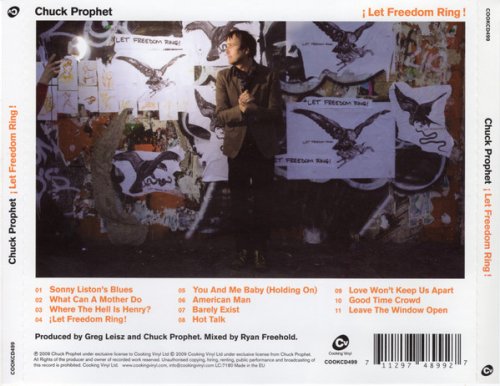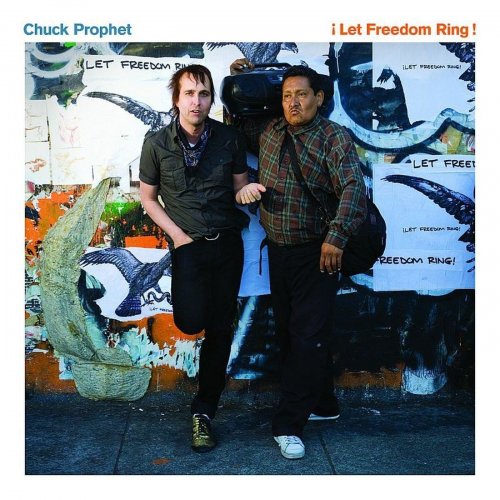
Chuck Prophet - Let Freedom Ring (2009) Lossless
BAND/ARTIST: Chuck Prophet
- Title: Let Freedom Ring
- Year Of Release: 2009
- Label: Cooking Vinyl
- Genre: Folk Rock, Alt Country
- Quality: Flac (tracks)
- Total Time: 39:15
- Total Size: 269 Mb
- WebSite: Album Preview

Tracklist:
01. Sonny Liston's Blues
02. What Can a Mother Do
03. Where the Hell Is Henry
04. Let Freedom Ring!
05. You and Me Baby (Holding On)
06. American Man
07. Barely Exist
08. Hot Talk
09. Love Won’t Keep Us Apart
10. Good Time Crowd
11. Leave the Window Open
Line-up:
Backing Vocals – Kelley Stoltz, Stephie Finch
Bass – Kevin T White
Bass, Backing Vocals – Rusty Miller
Drums – Ernest Carter
Fiddle, Harmony Vocals – Sara Watkins
Guitar – James DePrato, Tom Ayres
Producer, Guitar – Greg Leisz
Chuck Prophet's ¡Let Freedom Ring! is a Born in the U.S.A. for our time. Not that the Californian troubadour and self-described ''hustler'' behind this 25th-anniversary update of Bruce Springsteen's ode to the irony of the American Dream deliberately set out to cop the Boss's monumental mojo, but the similarities between the two records are uncanny. Both are concept albums of sorts that manifest patriotism through disenchantment, and both rely heavily on marginalized characters to expose socioeconomic woe.
''I've been saying they're political songs for non-political people,'' Prophet explains over the phone from his San Francisco home. ''But what I really mean is that I'm not a particularly political person, but the characters in these songs are all living in a kind of anxious time.''
¡LFR!'s title track a nod not to the Liberty Bell but to the NYSE exemplifies that anxiety through retirement-plan decimation. The buoyant, power-pop music deceptively suggests a feel-good anthem, but once the lyrics unfold, a Social Darwinistic tale is told, of Bernie Madoffs leeching off Average Joes ''The hawk cripples the dove,'' as Prophet puts it who reduce their victims to blind-drunk poor boys. Elsewhere, ''Barely Exist'' continues the Springsteen parallel, with Prophet replacing the Boss's struggling blue-collar worker with a struggling Mexican immigrant. Over a fragile beat and sparse guitar notes, he sums up the day laborer's plight: ''You gotta be strong/But when you got asbestos in your Kool-Aid for breakfast/There's no good way to look alive.''
''I think we go too far out of our way to define ourselves by our borders,'' Prophet says. ''Hundreds of people die every year trying to get into this country, just for the opportunity to clean our toilets and change our babies' diapers, and if it's somebody who's just trying to provide for their family, how can you criminalize that? And, really, isn't that the least of our problems right about now?''
The beauty of ¡LFR! lies in its raw, no-frills approach. Lightning-rod guitars spark a combustible rhythm section. Songs of radio-friendly length emerge from only a couple of live takes. Down-tempo and uptempo numbers play well in the same sandbox. Witty lyrics with rich imagery it's hard to shake ''By the time her shoes wore out/She was giving blood'' from ''What Can a Mother Do'' demonstrate a mastery of language, like the rock 'n' roll equivalent of folkie Todd Snider as delivered through Tom Petty's voice were it even more reliant on stoner/surfer cadences. Other gems include ''Sonny Liston's Blues,'' a riff on the monstrous former boxing champ's loss to Muhammad Ali as symbolic of good over evil (replete with air-guitar-inspiring passages on a Gretsch that Prophet says was ''strung up heavy''), and ''Where the Hell Is Henry?,'' a 2'17'' identity-theft gut punch about a con artist masquerading as a Kennedy.
Prophet recorded ¡LFR! his ninth solo album in a career better known for its songwriting and producing contributions to the oeuvres of Alejandro Escovedo, Kelly Willis, and Warren Zevon, among others in Mexico City, in a state-of-the-art (circa 1957) studio. The conditions were less than ideal (swine-flu mania, earthquakes, drug wars on the periphery), but Prophet says the duress made a band out of the ragtag crew. ''One thing I could never have predicted is that in Mexico City, the power goes out, like, five times a day,'' he says. ''And, of course, every time it would go out, it would be in the middle of a completely magical sort of Marquee Moon moment. And so every take you hear on the record, there's, like, triumph at the end of it.''~The Village Voice
''I've been saying they're political songs for non-political people,'' Prophet explains over the phone from his San Francisco home. ''But what I really mean is that I'm not a particularly political person, but the characters in these songs are all living in a kind of anxious time.''
¡LFR!'s title track a nod not to the Liberty Bell but to the NYSE exemplifies that anxiety through retirement-plan decimation. The buoyant, power-pop music deceptively suggests a feel-good anthem, but once the lyrics unfold, a Social Darwinistic tale is told, of Bernie Madoffs leeching off Average Joes ''The hawk cripples the dove,'' as Prophet puts it who reduce their victims to blind-drunk poor boys. Elsewhere, ''Barely Exist'' continues the Springsteen parallel, with Prophet replacing the Boss's struggling blue-collar worker with a struggling Mexican immigrant. Over a fragile beat and sparse guitar notes, he sums up the day laborer's plight: ''You gotta be strong/But when you got asbestos in your Kool-Aid for breakfast/There's no good way to look alive.''
''I think we go too far out of our way to define ourselves by our borders,'' Prophet says. ''Hundreds of people die every year trying to get into this country, just for the opportunity to clean our toilets and change our babies' diapers, and if it's somebody who's just trying to provide for their family, how can you criminalize that? And, really, isn't that the least of our problems right about now?''
The beauty of ¡LFR! lies in its raw, no-frills approach. Lightning-rod guitars spark a combustible rhythm section. Songs of radio-friendly length emerge from only a couple of live takes. Down-tempo and uptempo numbers play well in the same sandbox. Witty lyrics with rich imagery it's hard to shake ''By the time her shoes wore out/She was giving blood'' from ''What Can a Mother Do'' demonstrate a mastery of language, like the rock 'n' roll equivalent of folkie Todd Snider as delivered through Tom Petty's voice were it even more reliant on stoner/surfer cadences. Other gems include ''Sonny Liston's Blues,'' a riff on the monstrous former boxing champ's loss to Muhammad Ali as symbolic of good over evil (replete with air-guitar-inspiring passages on a Gretsch that Prophet says was ''strung up heavy''), and ''Where the Hell Is Henry?,'' a 2'17'' identity-theft gut punch about a con artist masquerading as a Kennedy.
Prophet recorded ¡LFR! his ninth solo album in a career better known for its songwriting and producing contributions to the oeuvres of Alejandro Escovedo, Kelly Willis, and Warren Zevon, among others in Mexico City, in a state-of-the-art (circa 1957) studio. The conditions were less than ideal (swine-flu mania, earthquakes, drug wars on the periphery), but Prophet says the duress made a band out of the ragtag crew. ''One thing I could never have predicted is that in Mexico City, the power goes out, like, five times a day,'' he says. ''And, of course, every time it would go out, it would be in the middle of a completely magical sort of Marquee Moon moment. And so every take you hear on the record, there's, like, triumph at the end of it.''~The Village Voice
Country | Folk | Rock | FLAC / APE
As a ISRA.CLOUD's PREMIUM member you will have the following benefits:
- Unlimited high speed downloads
- Download directly without waiting time
- Unlimited parallel downloads
- Support for download accelerators
- No advertising
- Resume broken downloads


